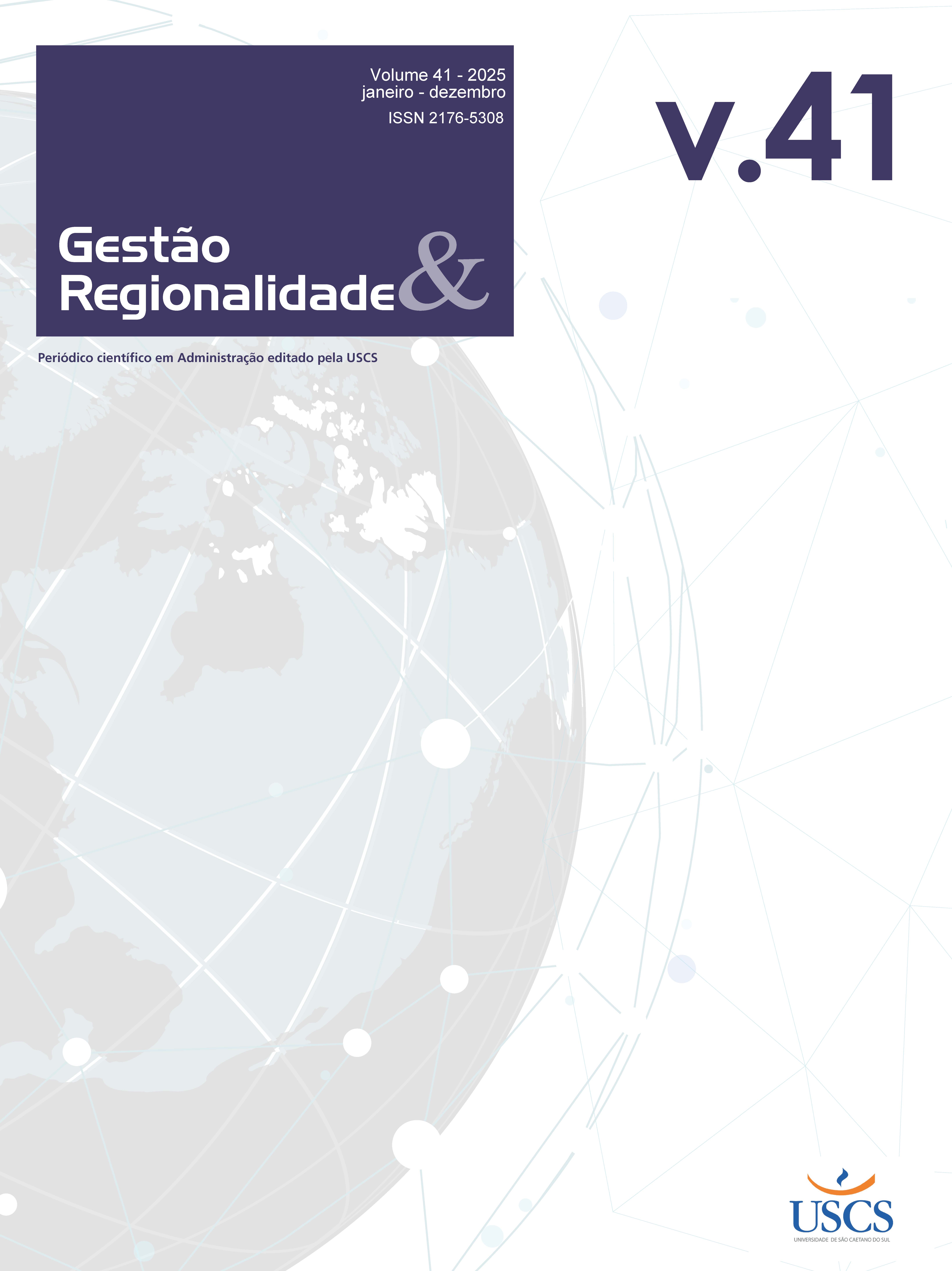The Opportunities and challenges in socioenvironmental and corporate governance practices: Company B
Socio-environmental and corporate governance practices: Company B
DOI:
https://doi.org/10.13037/gr.vol41.e20258862Keywords:
Corporate sustainability, Socioenvironmental responsability, B moviment, Low carbon economyAbstract
In recent decades, the population's production and consumption patterns have contributed to the worsening of the environmental and social crisis, due to the lack of commitment to sustainability, especially in the business sector. In this context, the concept of “Company B” emerges, which brings together corporate organizations that seek to solve socio-environmental problems in parallel with the development of their activities as a private entity. The purpose of this article is to analyze opportunities and challenges of institutions certified as “Company B”. The methodology is based on document analysis of data from the “Company B” platform. As a result: several Brazilian companies are recognized in this segment (eg Natura, Aoka Tours, Granato). This movement is growing and can create new market opportunities and change in the behavior of consumers of these products, but there are still many doubts from companies regarding regulatory aspects of the market that make it difficult for a greater number of organizations to enter this segment.
Downloads
References
BARRETO, T. S.; MOREIRA, R. N. Impacto Ambiental provocado pela destinação incorreta de Pneus. Revista Eniac Pesquisa, v. 4 (2), 162-175, 2015.
ZELDIN, S.; MCDANIEL, A.K.; TOPITZES, D.; CALVERT, M. Youth in decision-making: A study on the Impacts of Youth on Adults and Organizations, 68p, 2000. Disponível em: www.ojp.gov/ncjrs/virtual-library/abstracts/youth-decision-making-study-impacts-youth-adults-and-organizations
CANABARRO, R.S.; et al. Impacto Socioambiental. In: ANAIS DO SIMPÓSIO SUL-MATO-GROSSENSE DE ADMINISTRAÇÃO 4.4, p. 518-533, 2021.
CLEGG, W.; HARRINGTON, R. W.; NORTH, M.; PASQUALE, R. Cyclic carbonate synthesis catalysed by bimetallic aluminium–salen complexes. Chemistry–A European Journal, v. 16 (23), p. 6828-6843, 2010.
COMINI, G. M.; FIDELHOLC, M.; RODRIGUES, J. Empresas B: princípios e desafios do movimento B Corp. In: ANAIS, 2014.
GLOBAL, PACTO. ESG - Rede Brasil do Pacto Global. Ed. São Paulo, 2021. Disponível em: www.gruponewspace.com.br
HEEDE, P. Effective and sustainable use of municipal solid waste incineration bottom ash in concrete regarding strength and durability. Resources, Conservation and Recycling, v. 167, p. 105356, 2021.
LOUETTE, A. Gestão do conhecimento: compêndio para a sustentabilidade, ferramentas de gestão de responsabilidade socioambiental. In: GESTÃO DO CONHECIMENTO: COMPÊNDIO PARA A SUSTENTABILIDADE, FERRAMENTAS DE GESTÃO DE RESPONSABILIDADE SOCIOAMBIENTAL, 86p., 2007.
MACHADO, D. G. Análise das relações entre a gestão de custos e a gestão do preço de venda: um estudo das práticas adotadas por empresas industriais conserveiras estabelecidas no RS. Revista Universo Contábil, v. 2 (1), p. 42-60, 2006.
MELO, R. D. S. O turismo em ambientes recifais: em busca da transição para a sustentabilidade. Caderno virtual de turismo, v. 5 (4), p. 34-42, 2005.
NORTHOUSE, L. Coping strategies and quality of life in women with advanced breast cancer and their family caregivers. Psychology & Health, v. 19 (2), p. 139-155, 2004.
CLARO, P.B.O. Entendendo o conceito de sustentabilidade nas organizações. Revista de Administração-RAUSP, v. 43 (4), p. 289-300, 2008.
PEDERSEN, L.H.; FITZGIBBONS, S.; POMORSKI, L. Responsible investing: The ESG-efficient frontier. Journal of Financial Economics, v. 142 (2), p. 572-597, 2021.
RODRIGUES, J. O movimento B Corp: significados, potencialidades e desafios. Doctoral dissertation, Universidade de São Paulo, 2016.
RODRIGUES, J. Empresas B: princípios e desafios do movimento B Corp. In: ANAIS, 2014.
SCHREIBER, D. Análise Reflexiva acerca das Contribuições da TI Verde para a Sustentabilidade Corporativa: Reflective analysis on green information technology contributions to corporate sustainability. Desenvolvimento em Questão, v. 19 (56), p. 264-281, 2021.
SHABANA, K. M. The business case for corporate social responsibility: A review of concepts, research and practice. International journal of management reviews, v. 12 (1), p. 85-105, 2010.
THEIS, V. Gestão de Resíduos Sólidos em empresas metalomecânicas de pequeno porte. Revista de Gestão Ambiental e Sustentabilidade, v. 7 (2), p. 230-247, 2008.
VILELA, B. A inovação a serviço da sustentabilidade: a experiência do Observatório de Inovação para Cidades Sustentáveis. Parcerias Estratégicas, v. 25 (50), p. 37-52, 2021.
WOOT, P.; KLEYMANN, B. Changing the cultural paradigm of management education: an imperative not an option, 11p. 2011. Disponível em: www.researchgate.net/publication/301629104_Changing_the_cultural_paradigm_of_management_education_an_imperative_not_an_option
Published
How to Cite
Issue
Section
License
Copyright (c) 1969 Cristini Rosa Pinheiro, Patricia Bilotta (Autor)

This work is licensed under a Creative Commons Attribution-NonCommercial-NoDerivatives 4.0 International License.
Autores que publicam nesta revista concordam com os seguintes termos:
- Autores mantém os direitos autorais e concedem à revista o direito de primeira publicação, com o trabalho simultaneamente licenciado sob a https://creativecommons.org/
licenses/by-nc-nd/4.0/ , permitindo o compartilhamento do trabalho com reconhecimento da autoria do trabalho e publicação inicial nesta revista. - Autores têm autorização para assumir contratos adicionais separadamente, para distribuição não-exclusiva da versão do trabalho publicada nesta revista (ex.: publicar em repositório institucional ou como capítulo de livro), com reconhecimento de autoria e publicação inicial nesta revista.
- Autores têm permissão e são estimulados a publicar e distribuir seu trabalho online (ex.: em repositórios institucionais ou na sua página pessoal) a qualquer ponto antes ou durante o processo editorial, já que isso pode gerar alterações produtivas, bem como aumentar o impacto e a citação do trabalho publicado (Veja O Efeito do Acesso Livre).
























